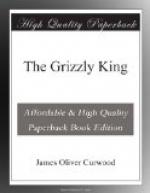One day he went farther than usual in his quest for roots. He was a good half-mile from the place he had made home, and he was sniffing about the end of a rock when a great shadow fell suddenly upon him. He looked up, and for a full half-minute he stood transfixed, his heart pounding and jumping as it had never pounded and jumped before in his life. Within five feet of him stood Thor! The big grizzly was as motionless as he, looking at him steadily. And then Muskwa gave a puppy-like whine of joy and ran forward. Thor lowered his huge head, and for another half-minute they stood without moving, with Thor’s nose buried in the hair on Muskwa’s back. After that Thor went up the slope as if the cub had never been lost at all, and Muskwa followed him happily.
Many days of wonderful travel and of glorious feasting came after this, and Thor led Muskwa into a thousand new places in the two valleys and the mountains between. There were great fishing days, and there was another caribou killed over the range, and Muskwa grew fatter and fatter and heavier and heavier until by the middle of September he was as large as a good-sized dog.
Then came the berries, and Thor knew where they all grew low down in the valleys—first the wild red raspberries, then the soap berries, and after those the delicious black currants which grew in the cool depths of the forests and were almost as large as cherries and nearly as sweet as the sugar which Langdon had fed Muskwa. Muskwa liked the black currants best of all. They grew in thick, rich clusters; there were no leaves on the bushes that were loaded with them, and he could pick and eat a quart in five minutes.
But at last the time came when there were no berries. This was in October. The nights were very cold, and for whole days at a time the sun would not shine, and the skies were dark and heavy with clouds. On the peaks the snow was growing deeper and deeper, and it never thawed now up near the sky-line. Snow fell in the valley, too—at first just enough to make a white carpet that chilled Muskwa’s feet, but it quickly disappeared. Raw winds began to come out of the north, and in place of the droning music of the valley in summertime there were now shrill wailings and screechings at night, and the trees made mournful sounds.
To Muskwa the whole world seemed changing. He wondered in these chill and dark days why Thor kept to the windswept slopes when he might have found shelter in the bottoms. And Thor, if he explained to him at all, told him that winter was very near, and that these slopes were their last feeding grounds. In the valleys the berries were gone; grass and roots alone were no longer nourishing enough for their bodies; they could no longer waste time in seeking ants and grubs; the fish were in deep water. It was the season when the caribou were keen-scented as foxes and swift as the wind. Only along the slopes lay the dinners they were sure of—famine-day dinners of whistlers and gophers. Thor dug for them now, and in this digging Muskwa helped as much as he could. More than once they turned out wagonloads of earth to get at the cozy winter sleeping quarters of a whistler family, and sometimes they dug for hours to capture three or four little gophers no larger than red squirrels, but lusciously fat.




